Great Garden Combo: A Fall Landscape Scene That Lasts
Fall is one of the most exciting seasons in the garden, when we can take advantage of the many fall foliage superstars to create a framework for late-blooming perennials. Rather than thinking in terms of selecting a favorite flower or two, create a colorful vignette of trees and shrubs that will span the seasons and give your garden a picture-perfect look in autumn.
When decorating a room, we typically start by choosing a wall color. With that in place, the fun begins to find the perfect flooring or accent rug before we finally consider the placement and style of furniture. The overall color palette is often kept restrained, with accessories providing the finishing touch and extra color punch.
Creating a garden vignette is a little like that. Begin by choosing the key vertical elements — the trees, selecting those that will look good over several seasons but that also have wonderful fall tints. For the ground plane, seek out shrubs and grasses that bring color, different leaf shapes and exciting textures to the scene. Finally add a swath of your favorite late-blooming perennials and accessorize with a fun container or two for a bright splash of color.
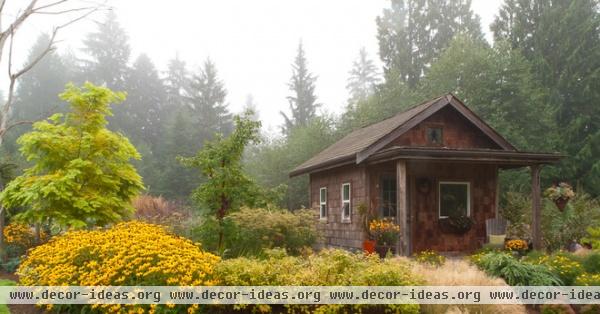
Creating a Foliage Picture Frame
In the scene here the eye is naturally drawn to the broad sweep of golden black-eyed Susan, yet this scene's good looks rely far more on great foliage than on these ephemeral flowers.
A mixture of evergreen and deciduous trees and shrubs creates a frame for these sunny daisies. Although just two trees punctuate the border, notice how several of the shrubs and grasses are planted in large groups to help balance the mass of flowers.
Strategic placement of simple containers helps to carry the color scheme through to the cabin's porch, creating a wonderful retreat for those who care to linger and enjoy the fall display.
The primary color scheme is gold and green, with a few bold accessories in orange, showing restraint while being still fun.
This combination will begin to develop in late July as the flowers start to bloom. Those plants that are deciduous or die back in winter will do so over a period of several months. Even when the last leaf has fallen, the evergreen grasses, conifer and striking bark of the maple tree will add interest.
Here's how to get the look.
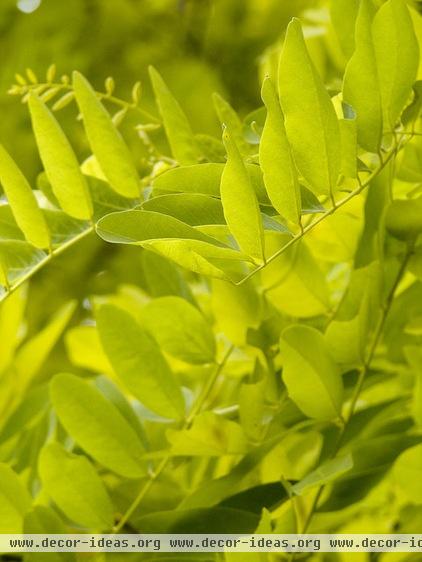
1. Start with the trees. Add height and structure with one or more trees. Both the golden locust tree and the paperbark maple used here offer great fall foliage, so that this late-season border will continue to be a garden showcase for several months.
The golden locust tree shines a foliage spotlight on the entire scene. The chartreuse leaves of spring and summer turn a softer yellow in fall — a beautiful counterpoint to the adjacent maple and a nice contrast to the cedar-shingled cabin.
Botanical name: Robinia pseudoacacia 'Frisia'
Common name: Golden locust tree
Where it will grow: Hardy to -30 degrees Fahrenheit (USDA zones 4 to 9; find your zone)
Water requirement: Low once established
Light requirement: Full sun for best color
Mature size: 30 to 50 feet tall and up to 20 feet wide
Seasonal interest: Spring to fall
When to plant: Plant it in well-drained soil in spring or fall.
Caution: Golden locust trees can produce unwanted suckers in some parts of the U.S.
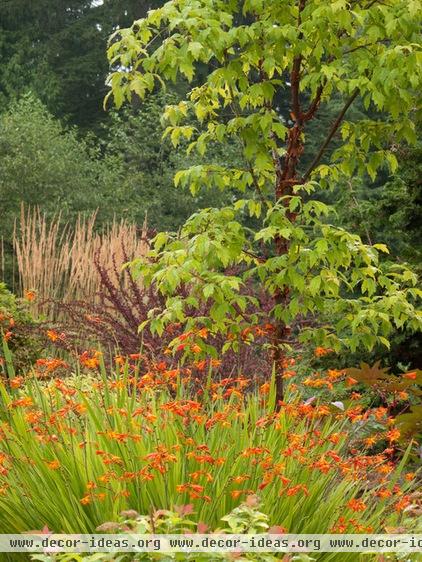
The paperbark maple is a more modest-size, slow-growing deciduous tree, prized not only for its beautiful foliage but also for its attractive peeling cinnamon-colored bark.
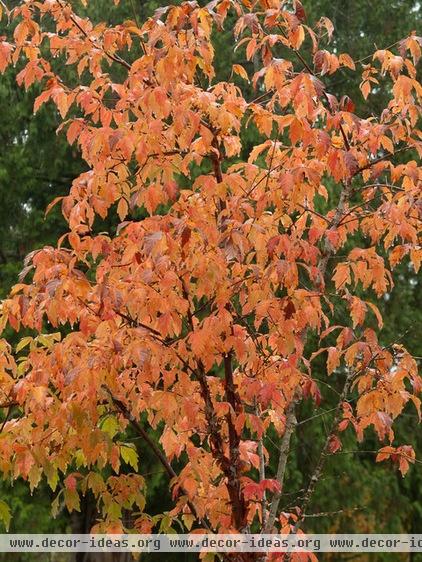
In fall the leaves of the paperbark maple change from green to shades of coral, peach and caramel — a wonderful highlight of any autumnal display.
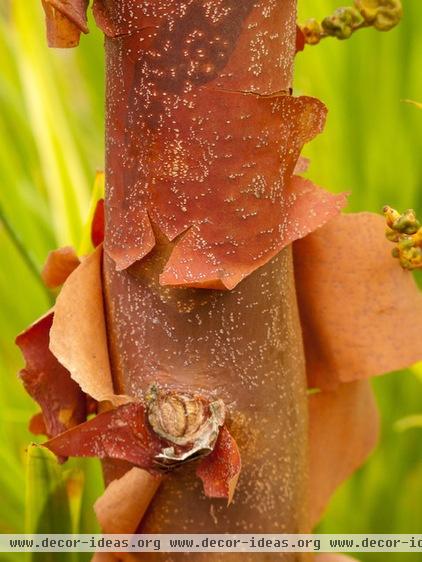
Botanical name: Acer griseum
Common name: Paperbark maple
Where it will grow: Hardy to -30 degrees Fahrenheit (zones 4 to 8)
Water requirement: Low once established
Light requirement: Full sun or partial shade
Mature size: 18 feet tall and up to 15 feet wide
Seasonal interest: Year-round
When to plant: Plant it in well-drained soil in spring or fall.
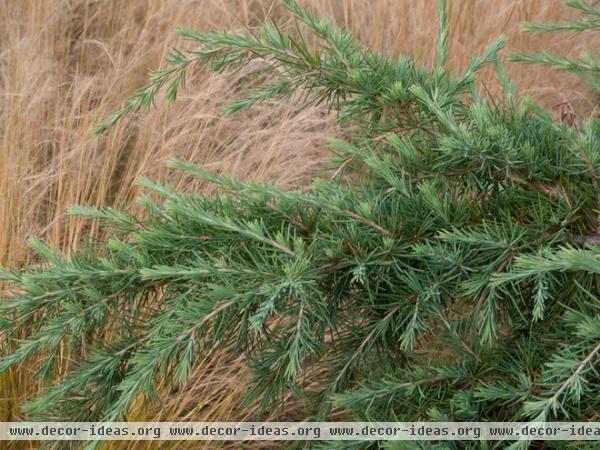
2. Add a lower tier of shrubs. With the height established, it is time to fill in the ground plane with an assortment of shrubs and low-growing conifers. Soft gold shades blend with blue-green to create a colorful fall tapestry.
Feelin' Blue deodar cedar is a standout in the garden with its low, wide-spreading habit and gorgeous blue tones. This evergreen conifer is completely low maintenance and deer resistant, and has also been drought tolerant in my garden.
Botanical name: Cedrus deodara 'Feein' Blue'
Common name: Feelin' Blue deodar cedar
Where it will grow: Hardy to 0 degrees Fahrenheit (zones 7 to 9)
Water requirement: Low once established
Light requirement: Full sun
Mature size: 2 to 4 feet tall and up to 6 feet wide. It can also be trained as a low standard to form a short weeping shrub.
Seasonal interest: Year-round
When to plant: Plant it in well-drained soil in spring or fall.
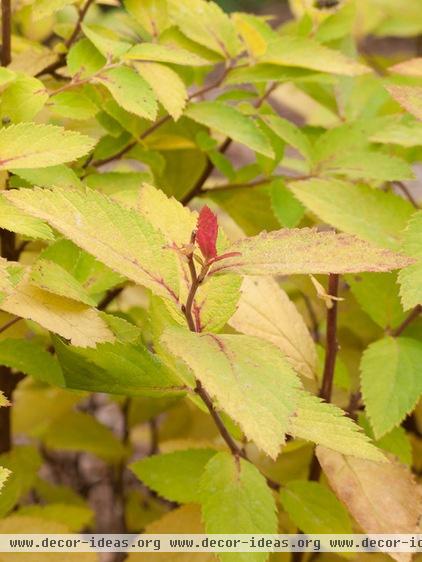
Spirea come in many sizes and its foliage comes in many colors — it's really just a matter of choosing your favorite. This design features Double Play Big Bang spirea.
In spring the foliage opens in shades of copper and orange, turning a soft green in summer and yellow in fall. Flat clusters of pink flowers attract butterflies in summer, and although deer do nibble the fresh shoots, I don't mind — it promotes a flush of new rosy growth, as shown here.
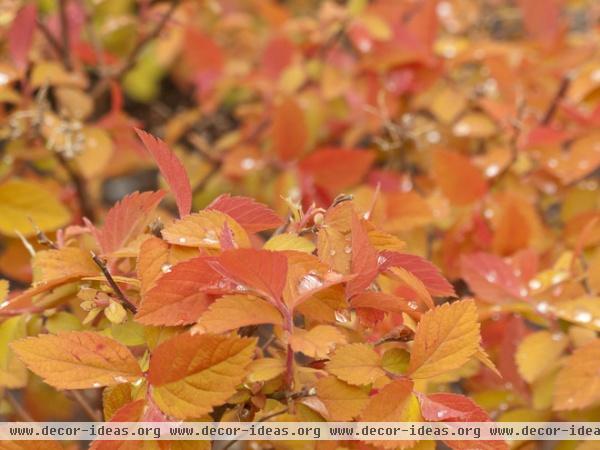
This is definitely a shrub to include in your garden for three seasons of interest.
Botanical name: Double Play Big Bang Spiraea 'Tracy'
Common name: Double Play Big Bang spirea
Where it will grow: Hardy to -30 degrees Fahrenheit (zones 4 to 9)
Water requirement: Low once established
Light requirement: Full sun
Mature size: 3 feet tall and wide
Seasonal interest: Spring through fall
When to plant: Plant it in well-drained soil in spring or fall.
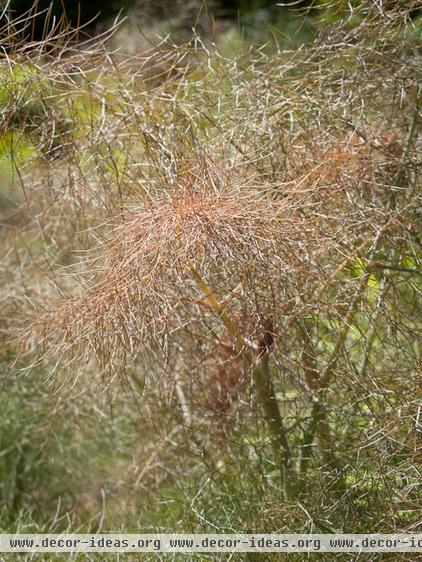
3. Use wispy textures to add softness. Bring a sense of movement to the garden by including delicate grasses or other fine-textured foliage that will move in the breeze. They will create a soft backdrop for the stiffer shrubs and flowers.
Who can resist bronze fennel? Not me! Just look at that foliage — and it looks even more amazing when the early morning dew collects on its feathery branches. Yes, it does self-seed, so perhaps this isn't for everyone — and indeed, this fall combo would still look lovely without it — but you have to admit that the feathery foliage is spectacular and definitely adds to this scene.
Botanical name: Foeniculum vulgare 'Purpureum'
Common name: Bronze fennel
Where it will grow: Hardy to -30 degrees Fahrenheit (zones 4 to 9). In zone 3 it can be enjoyed as an annual without fear of the seeds' overwintering
Water requirement: Low
Light requirement: Full sun
Mature size: 6 feet tall and wide
Seasonal interest: Spring through fall
When to plant: Plant it in well-drained soil in spring.
Caution: Bronze fennel can self-seed and become a nuisance.
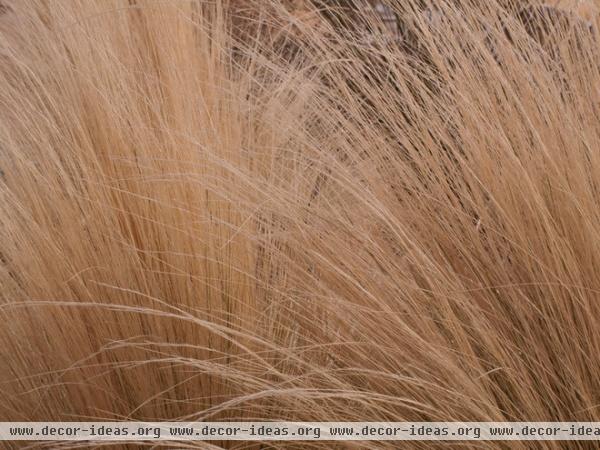
Grasses are the usual choice for adding fine texture to the garden, and the evergreen Mexican feather grass is one of my personal favorites, since it is not invasive where I live. You may prefer to substitute orange hair sedge (Carex testacea, zones 7 to 10), which is also evergreen and would keep within the color scheme.
Botanical name: Stipa tenuissima
Common name: Mexican feather grass
Where it will grow: Hardy to -10 degrees Fahrenheit (zones 6 to 10); avoid planting where it is invasive.
Water requirement: Low
Light requirement: Full sun
Mature size: 18 to 36 inches tall and wide
Seasonal interest: Year-round
When to plant: Plant it in well-drained soil in spring.
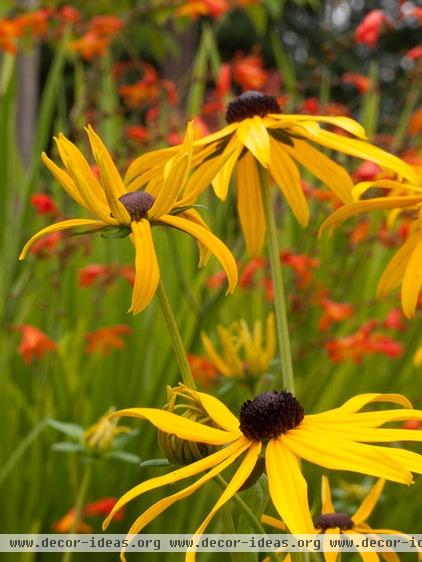
4. Add bold sweeps of your favorite fall flowers. Black-eyed Susans are without a doubt a fall favorite. Place them within a picture frame of beautiful foliage, and they will really shine.
Botanical name: Rudbeckia 'Goldsturm'
Common name: Black-eyed Susan
Where it will grow: Hardy to -10 degrees Fahrenheit (zones 6 to 10)
Water requirement: Low to average
Light requirement: Full sun or partial shade
Mature size: 3 feet tall and wide
Seasonal interest: Summer through fall
When to plant: Plant it in well-drained soil in spring or fall.
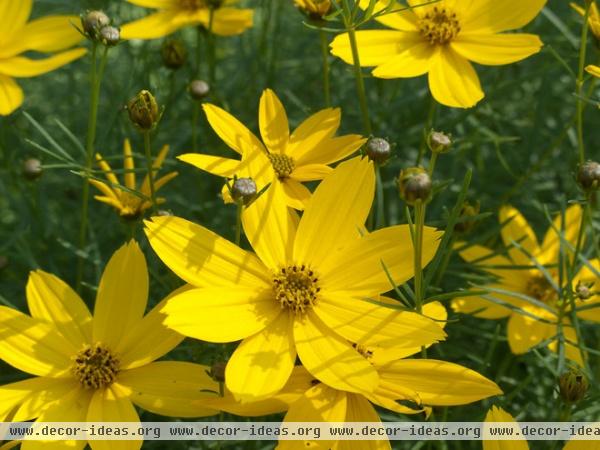
Zagreb tickseed is a remarkably low-maintenance perennial that produces dozens of 1-inch-diameter yellow daisies over a period of several months without deadheading. In the first photograph you can see they have been used to flank the pathway leading to the cabin.
Botanical name: Coreopsis verticillata 'Zagreb'
Common name: Zagreb tickseed
Where it will grow: Hardy to -40 degrees Fahrenheit (zones 3 to 9)
Water requirement: Low
Light requirement: Full sun
Mature size: 2 feet tall and wide
Seasonal interest: Spring through fall
When to plant: Plant it in well-drained soil in spring or fall.
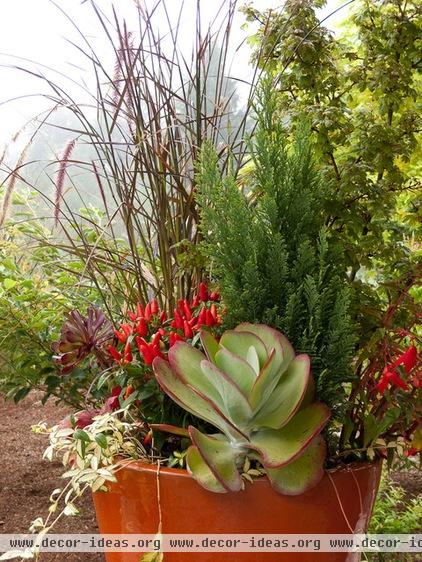
5. Accessorize. Add detail and an extra layer of color by incorporating a fall container garden into your vignette. This container sits on the cabin porch, and while the combination keeps within the overall warm color scheme of the garden planting combination, it moves beyond the golden yellows to fiery red and orange.
Caution: Some of the plants listed in this ideabook may be invasive in your area. Check with your local cooperative extension or county extension office before planting any.












